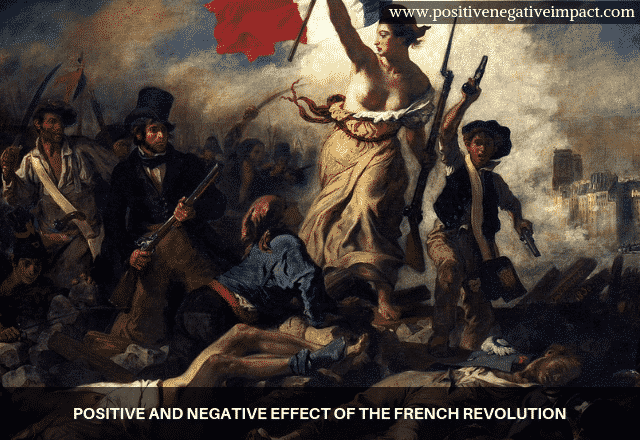The French Revolution marked a turning point in the history of the Western World. The people of France rose up in defiance of exploitative and repressive values that had existed for centuries. As a result, it upheaved Europe’s status quo marking the beginning of the end of Monarchy in Europe. This didn’t come without a negative impact. Thousands died in the Reign of Terror, war destroyed France’s economy, and democracy was soon replaced by dictatorship.

Positive Effects of the French Revolution
Weakened Monarchism
The French Revolution was the beginning of the end of absolutism, which was common across Europe over the last few centuries. Even the monarchy was restored in 1815, the king of France could no longer rule arbitrarily. He was bound by constitutional law, which flourished into the Third Republic later in the 19th century.
Codified laws brought by Napoleon’s conquest spread Republican values throughout Europe. After the many deposed monarchs of Europe were restored, these laws remained. These seeds eventually grew into the liberal democracies across Europe.
Rights Of The Individual
One of the most important set of principles that emerged from the French Revolution were contained in the “Declaration of the Rights of Man and of the Citizen.”
This one document granted freedom of speech, press, ownership, and association of land. Socially discriminative system like the Estate system were dismantled. The nobility held no additional rights to the poorest farmer in France and the Church could no longer dictate the lives of its followers. These ideas spread throughout Europe during the Napoleonic wars.
Women did have some sway over the newly formed Republican government and lobbied for change through various clubs. Slavery was also abolished in France’s colonies. Both steps forward were later reversed by Napoleon, but seeds were sewn for the suffrage and antislavery movement in France.
Economic Equality
Before the French Revolution, most land was owned by the Church or Nobility. When they were removed from power, this land was redistributed to small land owners. Tithes and Taxes were reduced, and suddenly thousands of new landowners existed.
In the cities, business flourished as old restrictions from pre-revolutionary France were abolished.
Negative Effects
Emigration
When the revolution become violent, members of France’s nobility fled the country to escape death. With them, they brought their wealth and education. This damaged France’s economy for many years to come.
Decades of War
As the Revolution ignited, the rest of Europe looked on in horror at the social and political upheaval. Anticipating an attack from Prussia and Austria, France preemptively declared war in 1792 kicking off the French Revolutionary Wars, followed by the Napoleonic Wars.
In just the Napoleonic Wars alone, over 3.7 million deaths are estimated. Economic destruction from Spain to Russia was widespread as well.
Rise of Nationalism
For many, the introduction of a people’s state ended the stark delineation between the individual and government. The state was now a direct reflection of the individual, which inspires loyalty and devotion in the form of nationalism.
A strong national identity in itself isn’t a bad thing, but it has led to all of the most tragic events of the 19th and 20th century. Japanese nationalism led to widespread destruction in China. Germany’s nationalism gave rise to World War 2 and the holocaust.
Even beyond these horrific events, nationalism can lead to racism and terrorism.
Further Reading
The French Revolution (History In An Afternoon) By Robert H. Wilde
The French Revolution and Napoleon By Charles Downer Hazen
- Tulip Mania – The Story of One of History’s Worst Financial Bubbles - May 15, 2022
- The True Story of Rapunzel - February 22, 2022
- The Blue Fugates: A Kentucky Family Born with Blue Skin - August 17, 2021
